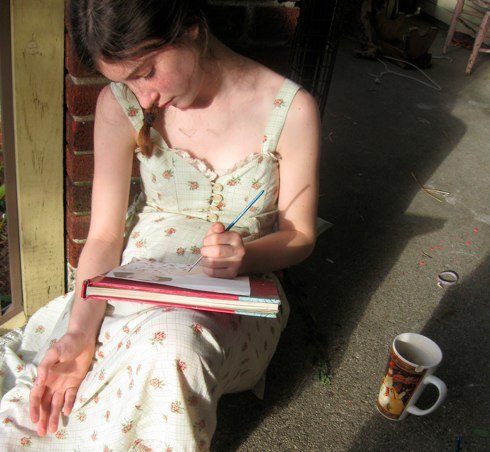People whose work is at least a little connected with creativity know perfectly well how hard it can sometimes be to force themselves to work. Especially when there is no inspiration and your views on the result with the customer's option are opposite. And in general, the planets are lined up wrong, deadlines are tight, and there is not a single sensible idea in my head. But there are people who have persuaded their muses to work according to the established schedule ;).

©photo
Rule #1. Set goals for yourself that you need to achieve in a certain period of time (day, week, month). According to the requirements, creative work is no different from standard work — the work must be completed and delivered to the client on time. After all, they don't tell you exactly when and how much you need to work, but when the end date is set, your brain subconsciously looks for various solutions if inspiration is asleep. Even if the epiphany comes on the last night, you will still complete the building. Perhaps even better than if you had floating deadlines and were waiting for your muse. Be sure to set yourself certain tasks that need to be completed clearly on schedule. Especially when you are working on creative projects!
Rule #2. Always keep a notebook handy. It all depends on what exactly you are doing. If your work is related to illustrations or design, it is best when you have your small sketchbook at hand. You never know where you will see new ideas?! It will be better if you can immediately make a small sketch. It works, even if you came up with an ingenious scheme — you can't dictate it to a dictaphone. A voice recorder is also a good and necessary thing. You can use it to record interesting ideas that come to mind anywhere! Later at work or at home, looking through seemingly unrelated passages, you can collect something new and very interesting
Rule #3. Structure it. As strange as it may sound in relation to creative projects, but this rule goes hand in hand with setting final goals and deadlines. By drawing up a clear scheme of your work, you help yourself not to be distracted from the main idea. And this happens quite often during brainstorming sessions, especially when a team of people is working. One gives out the main idea, the second picks it up and it's off! As a result, people get so carried away that the result is far from the original idea. For example, they started about mineral water, and ended up with an idea for advertising baby diapers.
Rule #4. Don't skip meals! This applies not only to your health, but also to productivity! Sometimes the work is so addictive that you are afraid to move, so as not to scare off the inspiration that has surged. And going grocery shopping or cooking something to eat is out of the question. Therefore, if you know that you have a long job ahead of you, take care of the availability of normal food in advance. In extreme cases, let there always be at least a piece of dark chocolate and green tea at hand!
Rule #5. Structure your brainstorms. In order to use brainstorms more productively, try to set priority goals for yourself. For example, in these 20 minutes I have to come up with 5 ideas for articles for our client, or write 10 slogans per day on a given topic, etc.
Rule #6. Thoroughly master your working tools. Whether it's a hammer, pencil or Adobe Illustrator. If you do not know thoroughly all the subtleties of working with your main tool, then you risk spending much more time working and getting a less outstanding result. By learning old and trying new tools for your work, you expand your capabilities and invest in your future.
From my personal experience, I can say that doing creative work is much more difficult than standard work when there is no inspiration, and it is much easier and more pleasant when you are bursting with ideas. Before, when I needed to draw something, I knew for sure that I wouldn't be able to do it during the day. My time is night. So in the afternoon I could just go out for a walk in the park, taking a sketchbook with me, and catching ideas. Having decided on the time when you work best, the second thing to do is to find harmony with yourself and the client. Even if you consider certain things unacceptable to yourself, you should remember that your client is not you, and not your friends or relatives. If he has set clear requirements (even if it looks or sounds absurd), you are obliged to do as ordered. Especially talented people manage to get something out of the client's head that he himself cannot really formulate, and give it shape and color! The option "well, I had a dream about a girl here and I want you to draw her, she's so … so… well, interesting" is quite real and even not uncommon. So as one man in the prime of his life said: "Calm down! Only calmness!»
And how do you force yourself to work when deadlines are burning, but there is still no inspiration?! Do you have your own interesting life hacks and stories related to creative work?